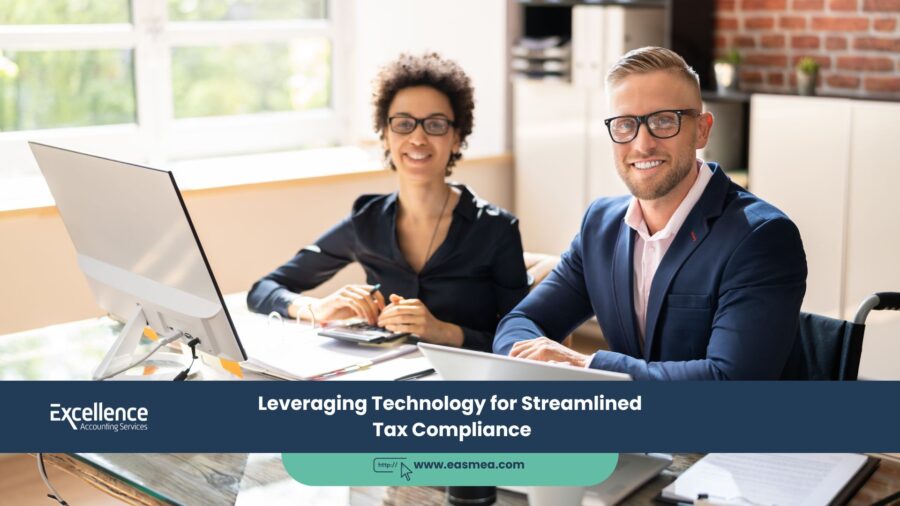Leveraging Technology for Streamlined Tax Compliance
The introduction of Value Added Tax (VAT) and now a federal Corporate Tax (CT) has fundamentally reshaped the operational landscape for businesses in the UAE. The era of manual bookkeeping in spreadsheets and reactive, year-end accounting is over. In its place is a new imperative for real-time, accurate, and digitally-native financial management. Attempting to navigate this complex, rules-based environment with outdated tools is not just inefficient—it is a direct path to non-compliance, penalties, and strategic blindness.
- Leveraging Technology for Streamlined Tax Compliance
- Part 1: The Demise of the Spreadsheet - Why Manual Methods Fail
- Part 2: The Core Technologies Driving Modern Tax Compliance
- Part 3: Practical Applications - Technology in Action
- How Excellence Accounting Services (EAS) Bridges Technology and Compliance
- Frequently Asked Questions (FAQs)
- Is Your Business Ready for the Digital Tax Era?
Technology is no longer a luxury for the finance department; it is the core engine of modern tax compliance. From cloud accounting platforms that automate daily transactions to artificial intelligence that predicts future liabilities, the right digital tools are the key to transforming tax from a burdensome obligation into a streamlined, strategic function. This guide explores the technological solutions available to UAE businesses, detailing how they can be leveraged to automate processes, enhance accuracy, ensure compliance, and unlock valuable insights in the new tax era.
Key Takeaways on Tax Technology
- Manual Methods are Obsolete: Spreadsheets are prone to errors and cannot provide the audit trails and real-time data required for modern VAT and Corporate Tax compliance.
- Cloud Accounting is the Foundation: Platforms like Zoho Books provide a centralized, automated, and accessible foundation for all tax-related data and processes.
- Automation Reduces Risk: Technologies like Robotic Process Automation (RPA) and AI can automate repetitive tasks like data entry and reconciliation, significantly reducing the risk of human error.
- Data is a Strategic Asset: Modern tax technology not only ensures compliance but also provides powerful data analytics for better financial forecasting and strategic decision-making.
- Proactive, Not Reactive: The right tech stack allows businesses to move from a reactive stance (fixing past errors) to a proactive one (preventing future issues and planning for tax efficiency).
Part 1: The Demise of the Spreadsheet – Why Manual Methods Fail
For years, spreadsheets were the go-to tool for small and medium-sized businesses. They were flexible and familiar. However, in a rules-based tax environment, their weaknesses become critical liabilities:
- High Risk of Human Error: A single typo, a broken formula, or an incorrect copy-paste can have cascading effects, leading to incorrect tax calculations and filings.
- Lack of Audit Trail: It’s nearly impossible to track who changed what and when in a complex spreadsheet, making it a nightmare during a tax audit. The FTA requires clear, auditable records.
- Data Silos: Different versions of the same spreadsheet can exist across departments, leading to confusion and a lack of a “single source of truth.”
- Inefficiency and Scalability Issues: As a business grows, managing finances in spreadsheets becomes exponentially more time-consuming and cumbersome. It cannot scale with your operations.
The transition away from manual methods is the first and most critical step towards building a robust compliance framework. This requires a strategic approach to accounting system implementation.
Part 2: The Core Technologies Driving Modern Tax Compliance
A modern tax compliance strategy is built on a stack of interconnected technologies. Each plays a distinct role in creating an efficient and accurate system.
1. Cloud Accounting Software: The Central Hub
Cloud accounting software is the non-negotiable foundation. Platforms like Zoho Books are designed from the ground up to handle the complexities of modern tax systems.
Key Features:
- Automated Bank Feeds: Automatically imports bank transactions, drastically reducing manual data entry and making account reconciliation a simple, daily task.
- Real-Time Reporting: Dashboards provide an instant overview of the company’s financial health, including VAT liability and estimated Corporate Tax.
- Built-in VAT Compliance: Automatically calculates VAT on invoices, generates FTA-compliant tax invoices, and prepares draft VAT returns.
- Digital Document Management: Attach receipts and invoices directly to transactions, creating a digital, auditable trail for every entry.
- Secure, Accessible Data: Information is stored securely in the cloud, accessible from anywhere, and backed up automatically.
2. Enterprise Resource Planning (ERP) Systems
For larger or more complex businesses (e.g., manufacturing, large-scale distribution), an ERP system integrates all facets of the operation—from inventory and supply chain to HR and finance—into a single database. A modern ERP has a dedicated finance module that handles tax calculations across the entire business cycle, ensuring consistency from procurement to sales.
3. Artificial Intelligence (AI) and Machine Learning (ML)
AI is moving beyond a buzzword and into practical application in finance. For tax, its roles include:
- Predictive Analytics: AI models can analyze historical data to forecast future tax liabilities with greater accuracy, aiding in cash flow management.
- Anomaly Detection: ML algorithms can scan thousands of transactions to flag outliers or potential errors that might indicate non-compliance, serving as a powerful tool for internal audit.
- Smart Categorization: AI can learn to automatically categorize expenses as they come in, ensuring they are correctly treated for tax deductibility purposes.
4. Robotic Process Automation (RPA)
RPA involves using software “bots” to perform repetitive, rules-based digital tasks. In a tax context, RPA can:
- Automate Invoice Processing: A bot can read data from a PDF invoice and enter it directly into the accounting system.
- Reconcile Accounts: RPA can be programmed to perform routine reconciliations between different systems (e.g., your CRM and your accounting software).
- Prepare Data for Filings: Bots can extract and format data from various sources to prepare it for the final review before a tax return filing. This improves the efficiency of both accounts payable and accounts receivable processes.
Part 3: Practical Applications – Technology in Action
How does this technology translate into tangible benefits for UAE businesses?
Streamlining VAT Return Filing
With a cloud accounting system, the quarterly VAT return filing process is transformed. Instead of a frantic scramble to gather invoices and reconcile numbers, the system automatically generates the VAT return report based on the transactions recorded throughout the period. The finance manager’s role shifts from data entry to high-level review and verification.
Preparing for the First Corporate Tax Return
Corporate Tax requires businesses to calculate their taxable income based on their accounting profit, with specific adjustments. Technology is indispensable here:
- Accurate P&L: A well-maintained accounting system provides the accurate Profit and Loss statement that is the starting point for the CT calculation.
- Expense Tracking: The system allows for meticulous tracking and categorization of all expenses, making it easy to identify non-deductible items.
- Fixed Asset Register: Technology maintains a digital register of all fixed assets, automatically calculating accounting and tax depreciation.
- Financial Reporting: Generating the required financial reports becomes a one-click process.
A compliant accounting system is not just a tool for filing; it’s a strategic asset that provides the data needed for high-level financial oversight. This is a core component of effective CFO services, enabling leadership to make informed decisions based on real-time, accurate data.
How Excellence Accounting Services (EAS) Bridges Technology and Compliance
Choosing and implementing the right technology can be daunting. EAS acts as your strategic partner, ensuring you have the right tools and the expertise to use them effectively.
- Accounting System Implementation: We are experts in deploying and configuring cloud accounting solutions like Zoho Books. Our implementation service ensures the system is tailored to your specific business needs and is fully compliant with UAE tax laws.
- Technology-Driven Bookkeeping: Our accounting and bookkeeping services leverage the best in cloud technology to provide you with efficient, accurate, and real-time financial records.
- System Review and Optimization: For businesses that already have systems in place, our accounting review service can assess your setup for compliance and efficiency, recommending improvements to your tech stack and processes.
- Outsourced Tax Services: We use our advanced technology stack to manage your end-to-end tax compliance, from VAT registration to filing Corporate Tax returns, freeing you to focus on your core business.
Frequently Asked Questions (FAQs)
For a very small business, it might be. However, a robust cloud accounting platform like Zoho Books is recommended because it’s specifically designed to be compliant with UAE regulations (like VAT), provides auditable digital records, and can scale with your business. It’s an investment in future-proofing your compliance.
It helps immensely. A cloud accounting system provides a clear, chronological, and unalterable audit trail. An auditor can easily trace any transaction from the final report back to its source document (e.g., a scanned invoice). This transparency and organization greatly simplify and expedite the audit process.
While technology can automate about 95% of the process (data collection, calculation, and report generation), a final human review is always essential. The business owner or a qualified tax advisor must review the system-generated return for accuracy and context before submission to the FTA.
The cost of modern cloud accounting software is surprisingly affordable, with monthly subscriptions often costing less than a single hour of a traditional accountant’s time. The return on investment, measured in time saved and penalties avoided, is typically very high.
Yes. Free Zone companies must still register for Corporate Tax and maintain meticulous financial records to prove their status as a “Qualifying Free Zone Person” and correctly distinguish between their qualifying and non-qualifying income. Technology is crucial for this level of detailed record-keeping.
An API (Application Programming Interface) is a way for different software programs to talk to each other. For example, your e-commerce website can use an API to send sales data directly to your accounting software, eliminating manual entry and ensuring data is captured in real-time for tax purposes.
For businesses with transactions between related parties, technology is key. ERP and accounting systems can tag and track all related-party transactions, ensuring you have a clear record. Specialized software can also help you benchmark your pricing against arm’s-length standards and prepare the required Master File and Local File documentation.
It is paramount. Your financial data is highly sensitive. Reputable cloud software providers invest heavily in data security, with measures like encryption, multi-factor authentication, and regular security audits, often providing a level of security that is far greater than what a small business could achieve on its own.
Yes, most modern systems are designed for this. Integrating your payroll services software with your accounting platform ensures that wage and salary expenses are recorded accurately and automatically, which is essential for calculating your Corporate Tax liability.
This is where partnering with a firm like EAS is crucial. A good advisor doesn’t just recommend software; they manage the implementation, migrate your data, train your team, and can even manage the software for you as part of an outsourced accounting service. You can gain the benefits of technology without needing to be an expert yourself.
Conclusion: The Digital Imperative for Tax Compliance
In the new UAE tax landscape, technology is the great enabler. It is the bridge between the complexities of tax law and the practical realities of running a business. By embracing cloud accounting, automation, and data-driven tools, companies can do more than just meet their compliance obligations. They can reduce risk, increase efficiency, and unlock the financial insights needed to thrive. The question for business leaders is no longer *if* they should invest in technology for tax compliance, but *how quickly* they can adopt the right solutions to build a resilient and future-ready finance function.




